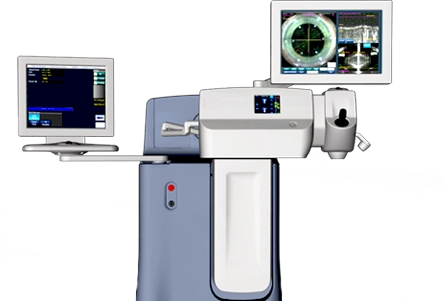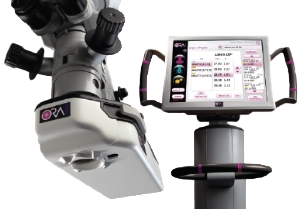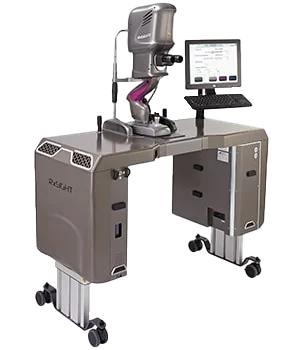
Cataract Surgery
At Nevada Eye Consultants, our board-certified ophthalmologists provide advanced cataract surgery to restore clear vision and improve quality of life for our patients in Reno, Carson City, Lake Tahoe, and nearby communities in Northern California and Northern Nevada. Our experienced team offers a range of cataract surgery options tailored to meet your individual needs and lifestyle, utilizing the latest technology to ensure optimized outcomes. Whether you’re seeking standard cataract surgery or a more customized approach, our goal is to help you see the world more clearly and comfortably.
- What are Cataracts?
- How Cataract Surgery Works
- Cataract Surgery Options
- Personalized Laser Cataract Surgery
- Premium Laser Cataract Surgery
- Custom Laser Cataract Surgery
- Cataract Surgery Technology
- Preparing for Cataract Surgery
- Cataract Surgery Day: What to Expect
- Cataract Surgery Recovery
- Follow-Up Visits After Cataract Surgery
- FAQs About Cataract Surgery
What are Cataracts?
Cataracts are a common eye condition that occurs when the eye’s natural lens, located behind the iris, becomes cloudy due to the clumping of proteins within the lens. This process typically begins around the age of 40, as the proteins in the lens start to break down and aggregate. As these cloudy areas develop, they gradually obstruct light from passing through the lens, leading to blurred or dimmed vision.
Initially, cataracts may cause minimal symptoms, but as the condition progresses, individuals often experience increasing difficulty with vision. Common symptoms include challenges seeing in low-light conditions, heightened sensitivity to glare, and colors that may appear faded or less vibrant. If left untreated, cataracts can significantly impair daily activities and ultimately result in vision loss.
Cataracts are a natural part of the aging process. In fact, according to the National Eye Institute,
Trusted Source
Cataract Data and Statistics
National Eye Institute
Go to Source
up to 50%
of Americans will develop at least one cataract by the time they reach the age of 75. Additionally, the American Academy of Ophthalmology reports that more than 20.5 million Americans over the age of 40 are currently living with
Trusted Source
Eye Health Statistics
American Academy of Ophthalmology
Go to Source
cataracts.

How Cataract Surgery Works
Cataract surgery is the only effective treatment for advanced cataracts, offering a reliable solution to restore clear vision. During this procedure, the clouded natural lens of the eye is carefully removed and replaced with a clear artificial intraocular lens implant (IOL). This new lens not only brings back sharp vision but can also correct common refractive errors, potentially reducing or even eliminating the need for glasses or contact lenses after the surgery.
Cataract surgery is among the most commonly performed surgeries in the United States, renowned for its high success rate and low risk of complications. By restoring visual clarity, this procedure greatly enhances patients’ quality of life, enabling them to enjoy their daily activities without the hindrances caused by cataracts.

Cataract Surgery Options
At Nevada Eye Consultants, our eye care specialists understand that each patient’s vision needs are unique. We offer a variety of cataract surgery options tailored to your specific lifestyle and vision goals. Whether you want to reduce your dependence on glasses or contact lenses or achieve the highest degree of customization for your vision, we have a solution that fits.
Personalized Laser Cataract Surgery
If you want the ability to customize your vision after surgery, Personalized Laser Cataract Surgery offers unparalleled flexibility. This option is ideal for those who have previously undergone refractive surgery such as LASIK, PRK, or RK. With the insertion of a Light Adjustable Lens™ (LAL) implant, you can adjust and fine-tune your vision post-surgery to meet your personal and lifestyle needs.
The procedure includes:
- Insertion of a Light Adjustable Lens (LAL) implant
- Use of the LenSx® Laser for a precise capsulotomy, lens fragmentation, and astigmatism correction (LRIs) if needed
Pre-operative testing includes:
- Measurement of the curvature, length, shape, and thickness of the eye and cornea
- Ocular Coherence Tomography (OCT) for macular health evaluation
- Pentacam evaluation for corneal topography
- ORA System™ Intraoperative Wavefront Aberrometry as needed
- Ocular dominance and tear production tests if required
Post-operative care involves:
- Follow-up visits at 1 day, 1 week, and 2 weeks after surgery
- Precision refractions and UV glasses compliance check
- Light treatments at Nevada Eye Consultants, including up to two adjustments, followed by a lock-in treatment

Premium Laser Cataract Surgery
For patients who desire the best possible distance and near vision after surgery and prefer a fully automated laser approach, Premium Laser Cataract Surgery is the optimal choice. This option replaces manual instruments with advanced laser technology to ensure the highest precision, particularly for astigmatism correction.
The procedure includes:
- Insertion of a Trifocal or Extended Depth of Focus (EDOF) lens implant
- Use of the LenSx® Laser for a precise capsulotomy, lens fragmentation, and astigmatism correction (LRIs) if needed
Pre-operative testing includes:
- Comprehensive measurements of the eye’s curvature, length, and cornea thickness
- OCT for macular health evaluation
- Pentacam evaluation for corneal topography
- ORA System™ Intraoperative Wavefront Aberrometry as needed
- Ocular dominance and tear production tests if required
Post-operative care involves:
- Multiple post-op evaluations
- Additional astigmatism correction procedures as necessary
- Laser vision correction if needed, provided at no additional cost (normally $2,500 to $2,600 per eye)
Custom Laser Cataract Surgery
Custom Laser Cataract Surgery is ideal for those who wish to achieve optimal vision for either distance or near, but are willing to wear glasses for one or the other. This option is also the required choice for monovision candidates, where one eye is corrected for distance and the other for near vision.
The procedure includes:
- Insertion of an advanced Monofocal or Toric (astigmatism-correcting) lens implant
- Use of the LenSx® Laser for a precise capsulotomy, lens fragmentation, and astigmatism correction (LRIs) if needed
Pre-operative testing includes:
- Detailed measurements of the eye’s curvature, length, and cornea thickness
- OCT for macular health evaluation
- Pentacam evaluation for corneal topography
- ORA System™ Intraoperative Wavefront Aberrometry as needed
- Ocular dominance and tear production tests if required
Post-operative care involves:
- Multiple post-op evaluations
- Additional astigmatism correction procedures as necessary
- Laser vision correction if needed, provided at no additional cost (normally $2,500 to $2,600 per eye)

Standard Cataract Surgery
For those who don’t mind wearing glasses after surgery, Standard Cataract Surgery is an excellent choice. This option involves the insertion of a standard lens implant, providing clear vision but typically requiring glasses for both distance and near tasks.
Cataract Surgery Technology
Providing patients with safe, comfortable, and effective treatment is extremely important to us at Nevada Eye Consultants. In order to deliver high-quality results to each of our patients, we seek to use only the most advanced technology at our practice.
LenSx® Femtosecond Laser System
While traditional cataract surgery uses a blade for incisions, the LenSx® femtosecond laser provides our surgeons with the ability to perform cataract surgery without the use of a blade. The LenSx® laser can also be used for limbal relaxing incisions (LRIs) during Custom Cataract Surgery. This all-laser approach has proven to produce significantly higher levels of
Trusted Source
Effectiveness and safety of femtosecond laser-assisted lens fragmentation and anterior capsulotomy versus the manual technique in cataract surgery
Reddy KP, Kandulla J, Auffarth GU
Go to Source
precision
when compared to traditional methods. The LenSx® system also enables our surgeons to gather a detailed, high-resolution image of the patient’s eye prior to surgery — when combined with the usual measurements taken for cataract surgery, this technology can further improve surgical outcomes.

ORA™ (Optiwave Refractive Analysis) System
Prior to cataract surgery, measurements of your eye are taken in order to select the appropriate IOL. However, in the past, the accuracy of these measurements involved a margin of error that could sometimes require revision surgery to exchange the IOL (intraocular lens). Thankfully, through the use of the ORA™ (Optiwave Refractive Analysis) intraoperative aberrometry system, our surgeons are able to take precise measurements through real-time analysis during surgery. This advancement helps to significantly improve the level of accuracy, and allows us to provide our patients with the best possible outcomes.

RxSight® Light Delivery Device (LDD)
The RxSight™ Light Adjustable Lens and Light Delivery Device (LDD) system allows our surgeons to work with you after cataract surgery to help you achieve your best possible vision. This is a revolutionary advancement in cataract treatment, due to the unpredictable nature of how the eye heals after cataract surgery. To optimize your eyesight following cataract surgery and IOL placement, your eye doctor can perform a series of treatments with the LDD technology, which non-invasively sends UV light to your Light Adjustable Lens to further improve your vision. Patients typically benefit from three to five light treatments, each lasting about 90 seconds.

Preparing for Cataract Surgery: Your Consultation
The consultation appointment is to evaluate your cataracts and the effects cataracts are having on your vision. The consultation appointment is not for surgery. Surgery, if needed, will be performed at a different appointment in an outpatient surgery center. After you check in at the front desk, one of our ophthalmic technicians will escort you into a private examination room. You will have a one on one conversation with your technician regarding your health history and you will be asked several questions regarding your vision and visual goals. Your technician will perform testing including, visual acuities, pupillary reaction, eye dominance, eye muscle movements, intraocular eye pressures, refraction, and dilation.
Dilation is done by placing drops in your eyes to enlarge pupil size. This allows the doctor to look inside the eyes and check your ocular health and the severity of your cataracts. The dilation takes about 15-20 minutes, on occasion it may take longer depending on the individual. Pupil dilation may blur your vision. Although it is not mandatory, if you are uncomfortable driving while dilated, you may want to arrange for someone to drive you home. Dilation can last for several hours, longer if you have lighter colored eyes.
Once pupils are dilated, you will be escorted to a different room to be seen by one of our eye surgeons. The doctor will do a thorough examination checking the front and back of the eye. The doctor will discuss with you all pertinent findings regarding the health of your eyes, and answer any questions that you may have.
Once you and your doctor have decided whether cataract surgery is the right option for you, you will be introduced to a surgery scheduler who will provide you with dates and times for future appointments and surgery. The scheduler will give you consent forms and information on different intraocular lens options that we offer at Nevada Eye Consultants. This information is for you to take home and review, no decisions are necessary at this time. You should bring the consent forms to your next appointment. Cataract surgery will be scheduled one eye at a time on separate dates to ensure safety.
Most medical insurances including Medicare and Medicaid pay for cataract eye surgery. Standard Monofocal lenses are covered by insurance, but Advanced Refractive IOLs and Premium IOLs are more expensive than the lenses typically covered by insurance and a fee in addition to payment by insurance is typically required.
Cataract surgery is the most common operation in the world. According to the National Institutes of Health, in the United States, more than 3 million procedures are performed annually.
Pre-Surgery Measurements
After you have selected a surgery date, we will have you return to our office for measurements to calculate the power of the intraocular lens that will be placed in your eye at the time of surgery.
These measurements may include, but are not limited to the following: The curvature of the eye, the length of the eye, orb scan measurement of the shape of the cornea, pachymetry corneal thickness, immersion scan, and B scan.
At this appointment we will discuss the consent forms and answer any questions you may have. You will be asked to sign the consent forms at this visit once all of your questions have been answered. You will be given a slip to have non-fasting lab work done at the location of your choice, the results will be faxed to us. You will also be given a prescription for one of the drops you will be using post operatively. You will want to get this prescription filled prior to your surgery date.
Although it is not typical to be dilated at this appointment, on occasion it is done for additional testing requested by the doctor. You may call our office and speak to a technician if you wish to know whether you will be dilated or not.
Cataract Surgery Day: What to Expect
Your surgery will take place at the outpatient surgery center preferred by your insurance. In most cases, the preferred surgery center is Eye Surgery Center of Northern Nevada which is adjacent to our office.
You should not eat or drink 6 hours prior to your procedure. You should take all medically necessary medication as you normally would with a small amount of water, unless otherwise instructed by the doctor. Any vitamins, supplements, or medications that are not vital, may be taken after your procedure. It is not necessary to discontinue any medication that you are on prior to your procedure. If you take coumadin, you do not need to discontinue taking it.
After you check into the facility one of the nurses will dilate your surgical eye, and start an IV. Once the eye is dilated and an IV has been placed you will be ready for your procedure. We do NOT use general anesthesia, however there is an anesthesiologist present who will administer a sedative to ensure your comfort, and to help you relax.
Cataract surgery takes about 15 minutes, but can vary with each individual person. Although surgery is completed in a short amount of time, please expect to be at the surgery center approximately 2 hours. You must have a driver to take you home after cataract surgery.

Cataract Surgery Recovery
Your vision will be blurry the day of your surgery. Most people notice significant vision improvement beginning the day after cataract surgery, but it is normal for the eye to be fuzzy for a few days or few weeks depending on the severity of the cataract. Minor irritation and foreign body sensation is normal, but you should not experience any pain following cataract surgery. Artificial tears or moisture drops should relieve any irritation you experience. You may use over the counter pain medication such as Tylenol or Advil for minor discomfort. Please call your doctor if you experience severe discomfort.
You may resume your normal activities, including reading and watching television the day of surgery. You may not drive until the next day, and you should use care driving if your vision is blurry the day after surgery. You do not have to wear an eye patch unless instructed to do so by the doctor. Dark glasses will be provided by the surgery center for comfort. You are not required to wear them, but you may find the eye is more comfortable with dark glasses. Please do not rub or place pressure on the eye during the first month. You may resume normal exercises the day after your procedure. You should not swim or wear eye makeup for one week.
Follow-Up Visits After Cataract Surgery
We will see you in our office the day after surgery. At this appointment we will check your vision, eye pressure, and the positioning of the intraocular lens. It is not uncommon for vision to still be blurry the day after surgery, but that should improve in the days ahead. Please bring your medications and medication instruction sheet (given to you at the surgery center) to this appointment.
After the first eye surgery is completed, you will need to be seen in either our office or your referring optometrist’s office prior to your second eye surgery. At this appointment we will check visual acuity, intraocular pressure and refraction in the postoperative eye.
After the second eye surgery is completed, we will repeat this process. Vision stabilizes quickly after cataract surgery, but is normal for minor fluctuations to occur for up to one month. After vision fully stabilizes, glasses will be prescribed if necessary. If there are no other health concerns with the eyes, follow up appointments will be every 1-2 years, and can be done with your optometrist.
FAQs About Cataract Surgery
Will insurance cover the cost of cataract surgery?
Yes, Medicare and most major insurance providers cover the cost of standard cataract surgery. However, advanced options like Personalized Laser Cataract Surgery, Premium Laser Cataract Surgery, and Custom Laser Cataract Surgery, which involve advanced technology IOLs and premium testing, are typically not covered. Our surgical coordinators will assist you in reviewing your insurance coverage, understanding any out-of-pocket expenses for these enhanced packages, and exploring financing options during your cataract consultation.
Is cataract surgery painful?
Cataract surgery is not typically painful. Before the procedure, anesthetic eye drops will numb your eyes, so you should only experience a slight sensation of pressure or mild scratchiness during the surgery. Some patients report minor soreness afterward, but significant pain is rare.
What are the potential risks of cataract surgery?
Cataract surgery is a highly common and generally safe procedure, with a success rate
Trusted Source
Is Cataract Surgery with Vision-Correcting IOLs Safe?
American Refractive Surgery Council
Go to Source
exceeding 99%.
However, like any surgical procedure, there are potential risks, although they are uncommon. These may include:
- Infection
- Bleeding
- Swelling
- Retinal detachment
- Blurred vision
- Vision loss
Who is a candidate for cataract surgery?
You might be a candidate for cataract surgery if you experience persistent vision issues despite updating your glasses or contact lenses, notice increased glare when driving at night, have blurry vision, or struggle with everyday visual tasks. A comprehensive eye examination with a specialist will determine if cataract surgery is the right option for you.
Can I prevent cataracts?
While cataracts cannot be entirely prevented, there are steps you can take to slow their progression:
Protect your eyes from UV light
- Eat a healthy diet rich in leafy greens
- Quit smoking
- Have annual comprehensive eye exams after age 60
Can cataracts come back after surgery?
Once cataracts are removed during surgery, they cannot return because the natural lens is replaced with an artificial one. However, some patients may develop posterior capsular opacification (PCO), sometimes called a “secondary cataract,” which can cause blurred vision. PCO is easily treated with a quick, in-office laser procedure.
Can I have cataract surgery if I have already had LASIK, PRK, or another eye surgery?
Yes, even if you’ve had previous laser eye surgeries like LASIK or PRK, you can still undergo cataract surgery. It’s important to provide your ophthalmologist with your complete medical history to ensure the best possible IOL power for your vision correction.
Will I be able to drive after cataract surgery?
You should refrain from driving until after your follow-up appointment, which typically occurs the day after surgery. Once your ophthalmologist confirms that your vision is stable, you can safely resume driving.
Will my vision be completely restored after cataract surgery?
Cataract surgery can significantly improve your vision, but whether you’ll need glasses afterward depends on the type of IOL you receive. Standard IOLs may still require the use of glasses for specific tasks, while advanced IOLs can reduce or eliminate this need.
1 National Eye Institute. Cataract Data and Statistics. Available: https://www.nei.nih.gov/learn-about-eye-health/eye-health-data-and-statistics/cataract-data-and-statistics/cataract-tables. Accessed September 3, 2024.
2 American Academy of Ophthalmology. Eye Health Statistics. Available: https://www.aao.org/newsroom/eye-health-statistics#. Accessed September 3, 2024.
3 Mayo Clinic. Cataract Surgery. Available: https://www.mayoclinic.org/tests-procedures/cataract-surgery/about/pac-20384765. Accessed September 3, 2024.
4 Reddy KP, Kandulla J, Auffarth GU. Effectiveness and safety of femtosecond laser-assisted lens fragmentation and anterior capsulotomy versus the manual technique in cataract surgery. J Cataract Refract Surg. 2013;39(9):1297-1306. doi:10.1016/j.jcrs.2013.05.035. Accessed September 3, 2024.
5 American Refractive Surgery Council. Is Cataract Surgery with Vision-Correcting IOLs Safe? Available: https://americanrefractivesurgerycouncil.org/refractive-surgery-procedures/cataract-surgery-with-vision-correcting-iols/is-cataract-surgery-with-vision-correcting-iols-safe. Accessed September 3, 2024.
The doctors at Nevada Eye Consultants have approved this content.
Page Updated:

